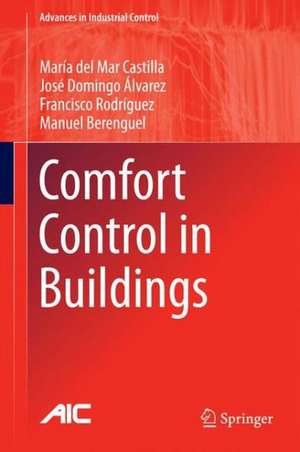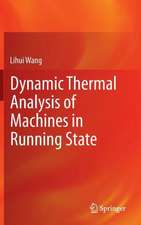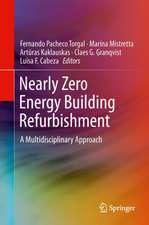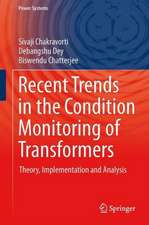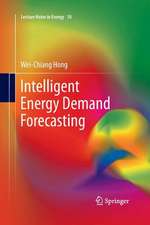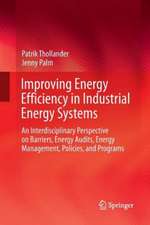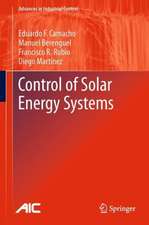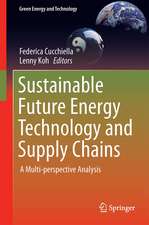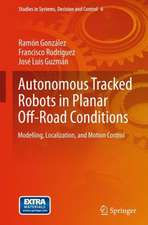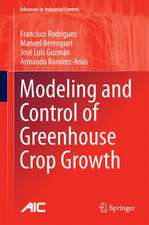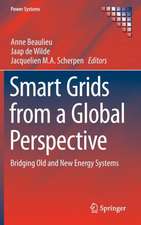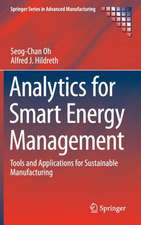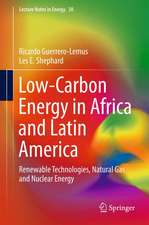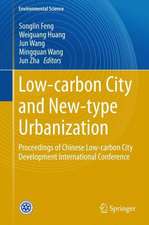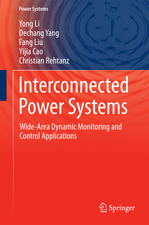Comfort Control in Buildings: Advances in Industrial Control
Autor María del Mar Castilla, José Domingo Álvarez, Francisco Rodríguez, Manuel Berenguelen Limba Engleză Hardback – 16 iul 2014
Energy consumption in buildings (residential and non-residential) represents almost the half of the total world energy consumption, and they are also responsible for approximately 35% of CO2 emissions. For these reasons, the reduction of energy consumption associated with the construction and use of buildings, and the increase of energy efficiency in their climatic refurbishment are frequently studied topics in academia and industry. As the productivity of users is directly related to their comfort, a middle ground needs to be found between comfort of users and energy efficiency. In order to achieve this, it is necessary to develop innovation and technology which can provide comfortable environments with minimum energy consumption. This book is intended for researchers interested in control engineering, energy and bioclimatic buildings, and for architects and process control engineers. It is also accessible to postgraduate students embarking on a career in this area, particularly those studying architecture.
| Toate formatele și edițiile | Preț | Express |
|---|---|---|
| Paperback (1) | 638.76 lei 6-8 săpt. | |
| SPRINGER LONDON – 17 sep 2016 | 638.76 lei 6-8 săpt. | |
| Hardback (1) | 644.95 lei 6-8 săpt. | |
| SPRINGER LONDON – 16 iul 2014 | 644.95 lei 6-8 săpt. |
Din seria Advances in Industrial Control
- 15%
 Preț: 643.34 lei
Preț: 643.34 lei - 23%
 Preț: 582.63 lei
Preț: 582.63 lei - 18%
 Preț: 783.98 lei
Preț: 783.98 lei - 18%
 Preț: 947.35 lei
Preț: 947.35 lei - 20%
 Preț: 568.24 lei
Preț: 568.24 lei - 15%
 Preț: 643.16 lei
Preț: 643.16 lei - 18%
 Preț: 899.21 lei
Preț: 899.21 lei - 18%
 Preț: 891.33 lei
Preț: 891.33 lei - 18%
 Preț: 740.57 lei
Preț: 740.57 lei - 18%
 Preț: 961.23 lei
Preț: 961.23 lei - 18%
 Preț: 955.08 lei
Preț: 955.08 lei - 15%
 Preț: 645.28 lei
Preț: 645.28 lei - 15%
 Preț: 638.43 lei
Preț: 638.43 lei - 18%
 Preț: 901.11 lei
Preț: 901.11 lei - 18%
 Preț: 1410.94 lei
Preț: 1410.94 lei - 18%
 Preț: 728.91 lei
Preț: 728.91 lei - 20%
 Preț: 1003.78 lei
Preț: 1003.78 lei - 18%
 Preț: 947.35 lei
Preț: 947.35 lei - 15%
 Preț: 643.34 lei
Preț: 643.34 lei - 15%
 Preț: 654.30 lei
Preț: 654.30 lei - 18%
 Preț: 950.52 lei
Preț: 950.52 lei - 15%
 Preț: 644.30 lei
Preț: 644.30 lei - 18%
 Preț: 1393.09 lei
Preț: 1393.09 lei - 18%
 Preț: 950.21 lei
Preț: 950.21 lei - 18%
 Preț: 949.90 lei
Preț: 949.90 lei - 18%
 Preț: 949.42 lei
Preț: 949.42 lei - 18%
 Preț: 950.52 lei
Preț: 950.52 lei - 18%
 Preț: 1113.71 lei
Preț: 1113.71 lei - 15%
 Preț: 650.04 lei
Preț: 650.04 lei - 15%
 Preț: 644.95 lei
Preț: 644.95 lei - 18%
 Preț: 950.33 lei
Preț: 950.33 lei - 18%
 Preț: 948.61 lei
Preț: 948.61 lei - 18%
 Preț: 1112.60 lei
Preț: 1112.60 lei - 15%
 Preț: 644.63 lei
Preț: 644.63 lei - 18%
 Preț: 953.20 lei
Preț: 953.20 lei - 18%
 Preț: 945.62 lei
Preț: 945.62 lei - 15%
 Preț: 640.88 lei
Preț: 640.88 lei - 15%
 Preț: 640.88 lei
Preț: 640.88 lei - 20%
 Preț: 650.92 lei
Preț: 650.92 lei - 18%
 Preț: 1112.60 lei
Preț: 1112.60 lei - 20%
 Preț: 998.36 lei
Preț: 998.36 lei - 15%
 Preț: 643.34 lei
Preț: 643.34 lei - 18%
 Preț: 948.92 lei
Preț: 948.92 lei - 18%
 Preț: 1381.43 lei
Preț: 1381.43 lei - 15%
 Preț: 651.51 lei
Preț: 651.51 lei - 15%
 Preț: 647.08 lei
Preț: 647.08 lei - 20%
 Preț: 563.66 lei
Preț: 563.66 lei - 18%
 Preț: 992.64 lei
Preț: 992.64 lei - 18%
 Preț: 1225.79 lei
Preț: 1225.79 lei
Preț: 644.95 lei
Preț vechi: 758.77 lei
-15% Nou
Puncte Express: 967
Preț estimativ în valută:
123.43€ • 134.02$ • 103.68£
123.43€ • 134.02$ • 103.68£
Carte tipărită la comandă
Livrare economică 22 aprilie-06 mai
Preluare comenzi: 021 569.72.76
Specificații
ISBN-13: 9781447163466
ISBN-10: 144716346X
Pagini: 250
Ilustrații: XXIV, 237 p. 129 illus., 118 illus. in color.
Dimensiuni: 155 x 235 x 20 mm
Greutate: 0.54 kg
Ediția:2014
Editura: SPRINGER LONDON
Colecția Springer
Seria Advances in Industrial Control
Locul publicării:London, United Kingdom
ISBN-10: 144716346X
Pagini: 250
Ilustrații: XXIV, 237 p. 129 illus., 118 illus. in color.
Dimensiuni: 155 x 235 x 20 mm
Greutate: 0.54 kg
Ediția:2014
Editura: SPRINGER LONDON
Colecția Springer
Seria Advances in Industrial Control
Locul publicării:London, United Kingdom
Public țintă
ResearchCuprins
Introduction.- A Case Study: the CDdI-CIESOL-ARFRISOL Building.- Comfort in Buildings.- Subsystems and Disturbance Models.- Comfort Control Techniques for the Users of a Room.- New Trends.
Notă biografică
Maria del Mar Castilla is a researcher at the University of Almería, Spain. She received the Computer Science Engineering degree from the University of Almería, Spain in 2009. She obtains the Ph.D. degree in advanced comfort control techniques inside buildings, which was performed in a solar energy research centre: the CIESOL mixed centre, from the University of Almería in 2013. Her research interests are focused on the fields of identification, modelling and predictive control with applications to energy efficient buildings. She has participated in several R&D projects and is co-author of many papers in international journals and conferences. She is member of the “Automatic control, Robotics and Mechatronics” research group, and the Comité Español de Automática (main Spanish Association in Automatic Control).
José Domingo Álvarez is a postdoctoral researcher at the University of Seville, Spain. He received the Computer Science Engineering degree from the University of Almería, Spain in 2003. Then, in 2008, he obtained, from the same university, the Ph.D. degree in Automatic Control in Solar Plants which was performed in a leading research centre in this field: the Solar Platform of Almería. His research interests are focused on the fields of repetitive control, predictive control and classical PID control with applications to solar power plants and energy efficient buildings. He is a member of the “Automatic control, Robotics and Mechatronics” research group. He has been director of 2 Ph.D. Thesis, has participated in several R&D projects and is co-author of many papers in reputed international journals with high impact factor. He is also a member of the Comité Español de Automática (main Spanish Association in Automatic Control).
Francisco Rodríguez Diaz is Associate Professor of Systems Engineering and Automatic Control at the University of Almería (Spain). He obtained his TelecommunicationEngineering degree from Madrid Polytechnics University (Spain) and his Ph.D. degree from the University of Almería in 2002. Now he is a researcher and member of the Automatic Control, Robotic and Mechatronic research group of the University of Almería. He has participated in several Spanish and European research projects, and I+D+i tasks with many companies. He is member of IFAC Technical Committee TC 8.1, Control in Agriculture, since 2005. His current research interests are focused to the application of modeling, automatic control, and robotics techniques to dynamic systems and education.
Manuel Berenguel is professor of Systems Engineering and Automatic Control at the University of Almería, Spain. He earned an industrial engineering degree and Ph.D. from the University of Seville, Spain. His research interests are in hierarchical, predictive and robust control, with applications to solar energy systems, agriculture, and biotechnology and in control education. He has been Vice-Rector of Information and Communication Technologies at University of Almería (Spain). He is also the head of the research group “Automatic control, Robotics and Mechatronics” (http://arm.ual.es). He is co-author of the book Advanced Control of Solar Plants (Springer, 1997), Control of Solar Energy Systems (Springer, 2012) and Control Automático con Herramientas Interactivas (Pearson Education, 2012). He is co-author of 2 patents, and more than 90 papers in international journals. He has participated in IPC of several international conferences and reviewer for several journals. He has been member of the board of Governors of the Comité Español de Automática (main Spanish Association in Automatic Control) from 2003 to 2008 and 2012-now, senior member of IEEE Control System Society and member of the IFAC Technical Committees TC 8.01 Control in Agriculture, TC 6.3. Power and Energy Systems and TC 8.4 Biosystems and bioprocesses.
José Domingo Álvarez is a postdoctoral researcher at the University of Seville, Spain. He received the Computer Science Engineering degree from the University of Almería, Spain in 2003. Then, in 2008, he obtained, from the same university, the Ph.D. degree in Automatic Control in Solar Plants which was performed in a leading research centre in this field: the Solar Platform of Almería. His research interests are focused on the fields of repetitive control, predictive control and classical PID control with applications to solar power plants and energy efficient buildings. He is a member of the “Automatic control, Robotics and Mechatronics” research group. He has been director of 2 Ph.D. Thesis, has participated in several R&D projects and is co-author of many papers in reputed international journals with high impact factor. He is also a member of the Comité Español de Automática (main Spanish Association in Automatic Control).
Francisco Rodríguez Diaz is Associate Professor of Systems Engineering and Automatic Control at the University of Almería (Spain). He obtained his TelecommunicationEngineering degree from Madrid Polytechnics University (Spain) and his Ph.D. degree from the University of Almería in 2002. Now he is a researcher and member of the Automatic Control, Robotic and Mechatronic research group of the University of Almería. He has participated in several Spanish and European research projects, and I+D+i tasks with many companies. He is member of IFAC Technical Committee TC 8.1, Control in Agriculture, since 2005. His current research interests are focused to the application of modeling, automatic control, and robotics techniques to dynamic systems and education.
Manuel Berenguel is professor of Systems Engineering and Automatic Control at the University of Almería, Spain. He earned an industrial engineering degree and Ph.D. from the University of Seville, Spain. His research interests are in hierarchical, predictive and robust control, with applications to solar energy systems, agriculture, and biotechnology and in control education. He has been Vice-Rector of Information and Communication Technologies at University of Almería (Spain). He is also the head of the research group “Automatic control, Robotics and Mechatronics” (http://arm.ual.es). He is co-author of the book Advanced Control of Solar Plants (Springer, 1997), Control of Solar Energy Systems (Springer, 2012) and Control Automático con Herramientas Interactivas (Pearson Education, 2012). He is co-author of 2 patents, and more than 90 papers in international journals. He has participated in IPC of several international conferences and reviewer for several journals. He has been member of the board of Governors of the Comité Español de Automática (main Spanish Association in Automatic Control) from 2003 to 2008 and 2012-now, senior member of IEEE Control System Society and member of the IFAC Technical Committees TC 8.01 Control in Agriculture, TC 6.3. Power and Energy Systems and TC 8.4 Biosystems and bioprocesses.
Textul de pe ultima copertă
The aim of this book is to research comfort control inside buildings, and how this can be achieved through low energy consumption. It presents a comprehensive exploration of the design, development and implementation of several advanced control systems that maintain users' comfort (thermal and indoor air quality) whilst minimizing energy consumption. The book includes a detailed account of the latest cutting edge developments in this area, and presents several control systems based on Model Predictive Control approaches. Real-life examples are provided, and the book is supplemented by illustrations, tables, all of which facilitate understanding of the text.
Energy consumption in buildings (residential and non-residential) represents almost the half of the total world energy consumption, and they are also responsible for approximately 35% of CO2 emissions. For these reasons, the reduction of energy consumption associated with the construction and use of buildings, and the increase of energy efficiency in their climatic refurbishment are frequently studied topics in academia and industry. As the productivity of users is directly related to their comfort, a middle ground needs to be found between comfort of users and energy efficiency. In order to achieve this, it is necessary to develop innovation and technology which can provide comfortable environments with minimum energy consumption. This book is intended for researchers interested in control engineering, energy and bioclimatic buildings, and for architects and process control engineers. It is also accessible to postgraduate students embarking on a career in this area, particularly those studying architecture.
Energy consumption in buildings (residential and non-residential) represents almost the half of the total world energy consumption, and they are also responsible for approximately 35% of CO2 emissions. For these reasons, the reduction of energy consumption associated with the construction and use of buildings, and the increase of energy efficiency in their climatic refurbishment are frequently studied topics in academia and industry. As the productivity of users is directly related to their comfort, a middle ground needs to be found between comfort of users and energy efficiency. In order to achieve this, it is necessary to develop innovation and technology which can provide comfortable environments with minimum energy consumption. This book is intended for researchers interested in control engineering, energy and bioclimatic buildings, and for architects and process control engineers. It is also accessible to postgraduate students embarking on a career in this area, particularly those studying architecture.
Caracteristici
Presents a comprehensive exploration of comfort control inside buildings and how this can be achieved through low energy consumption Discusses the main standard comfort indexes and considers the development of approximated models for such indexes Provides real-life examples to facilitate understanding of the text Includes supplementary material: sn.pub/extras
